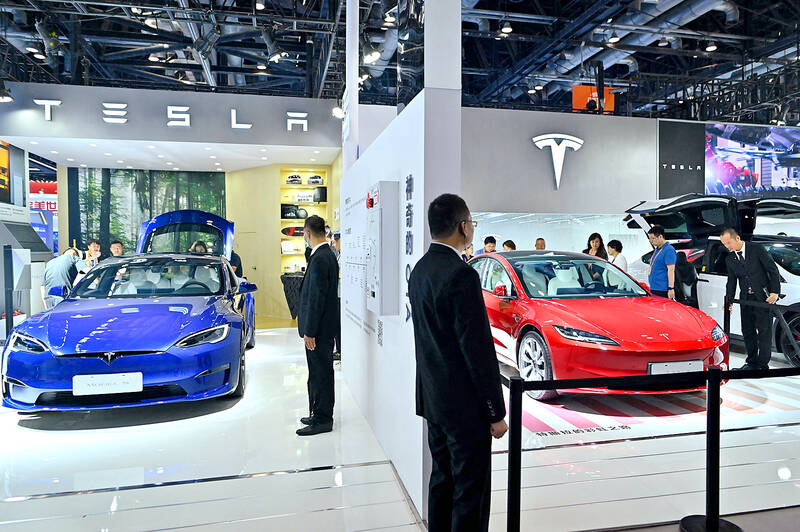Tesla Inc’s job cuts are escalating in China, sources familiar with the matter said, as Elon Musk contends with growing pressure to win back share in the world’s biggest auto market.
Additional layoffs began earlier this week, extending cuts from last month, as part of the electric vehicle (EV) maker’s pledge to slash global headcount by more than 10 percent, said the sources, who asked not to be identified as they are not authorized to disclose the information publicly.
The latest move affects a range of departments, including customer service staff, engineers, production line workers and the logistics team at Tesla’s Shanghai plant — home to more than half the company’s global production, the sources said, adding that the layoffs last month more directly impacted sales representatives.

Photo: AFP
It is unclear how many people would be affected and what impact it might have on Tesla’s China operations. The company’s China-based representatives did not immediately respond to requests for comments.
A global slowdown in EV demand has sparked Tesla’s biggest layoffs. However, the hit has been particularly acute in China, where intense competition from rivals like BYD Co and weak consumer sentiment is hurting sales. Shipments from its Shanghai factory dropped 18 percent last month even as the overall market for new energy vehicles grew 33 percent.
Tesla’s China market share shrank to about 7.5 percent in the first quarter of this year, from 10.5 percent in the same period last year, Bloomberg News calculations showed.
In addition to the ongoing cuts, Tesla’s China business would see the return of Tom Zhu (朱曉彤), who previously headed the automaker’s Asia-Pacific operations and led its entry into China, Bloomberg News reported on Wednesday. Zhu had been promoted to senior vice president of automotive in April last year, overseeing global production, sales, deliveries, service and the company’s factories from Tesla’s Austin headquarters.
The layoffs come despite Tesla winning in-principle approval from government officials to deploy its driver-assistance system in China, which would be an immediate revenue boost. It was granted the approval under certain conditions and managed to clear two important hurdles: Reaching a mapping and navigation deal with Chinese tech giant Baidu Inc, and meeting requirements for how it handles data-security and privacy issues.
Most of the laid-off employees in China would receive a payout equivalent to one month’s pay for every year worked, plus an additional three months’ salary, sources familiar with the matter said.
Some staff were escorted out of their workplaces by managers and some left in groups via shuttle buses, one of the sources said.
Globally, a growing number of executives have left Tesla, most of the company’s 500-person Supercharger team and its newly formed marketing team have been axed, and the automaker is rescinding offers just weeks before internships were set to start.

South Korea’s equity benchmark yesterday crossed a new milestone just a month after surpassing the once-unthinkable 5,000 mark as surging global memory demand powers the country’s biggest chipmakers. The KOSPI advanced as much as 2.6 percent to a record 6,123, with Samsung Electronics Co and SK Hynix Inc each gaining more than 2 percent. With the benchmark now up 45 percent this year, South Korea’s stock market capitalization has also moved past France’s, following last month’s overtaking of Germany’s. Long overlooked by foreign funds, despite being undervalued, South Korean stocks have now emerged as clear winners in the global market. The so-called “artificial intelligence

NEW IDENTITY: Known for its software, India has expanded into hardware, with its semiconductor industry growing from US$38bn in 2023 to US$45bn to US$50bn India on Saturday inaugurated its first semiconductor assembly and test facility, a milestone in the government’s push to reduce dependence on foreign chipmakers and stake a claim in a sector dominated by China. Indian Prime Minister Narendra Modi opened US firm Micron Technology Inc’s semiconductor assembly, test and packaging unit in his home state of Gujarat, hailing the “dawn of a new era” for India’s technology ambitions. “When young Indians look back in the future, they will see this decade as the turning point in our tech future,” Modi told the event, which was broadcast on his YouTube channel. The plant would convert

‘SEISMIC SHIFT’: The researcher forecast there would be about 1.1 billion mobile shipments this year, down from 1.26 billion the prior year and erasing years of gains The global smartphone market is expected to contract 12.9 percent this year due to the unprecedented memorychip shortage, marking “a crisis like no other,” researcher International Data Corp (IDC) said. The new forecast, a dramatic revision down from earlier estimates, gives the latest accounting of the ongoing memory crunch that is affecting every corner of the electronics industry. The demand for advanced memory to power artificial intelligence (AI) tasks has drained global supply until well into next year and jeopardizes the business model of many smartphone makers. IDC forecast about 1.1 billion mobile shipments this year, down from 1.26 billion the prior

People stand in a Pokemon store in Tokyo on Thursday. One of the world highest-grossing franchises is celebrated its 30th anniversary yesterday.